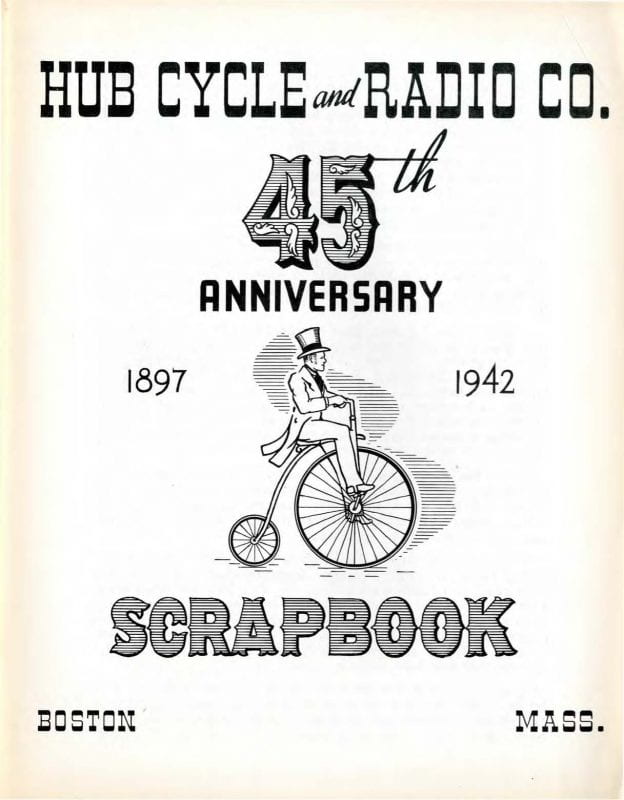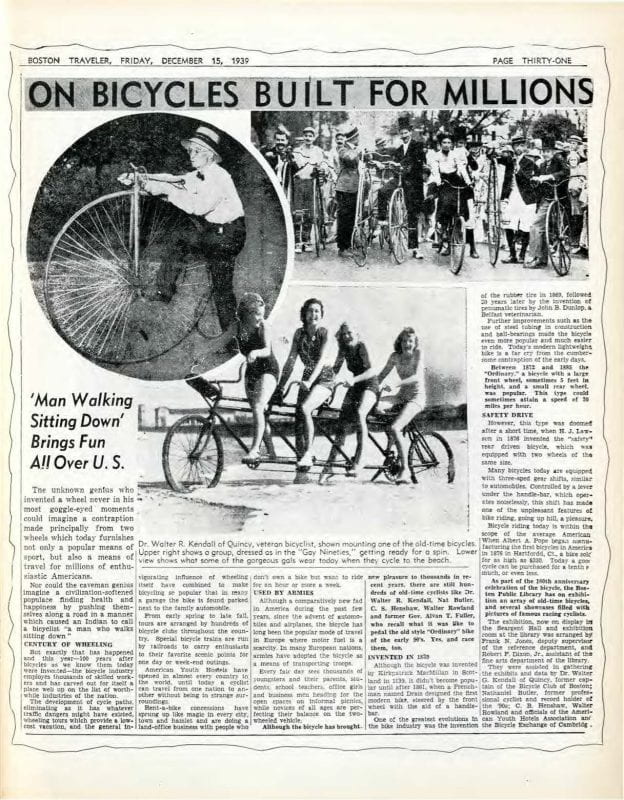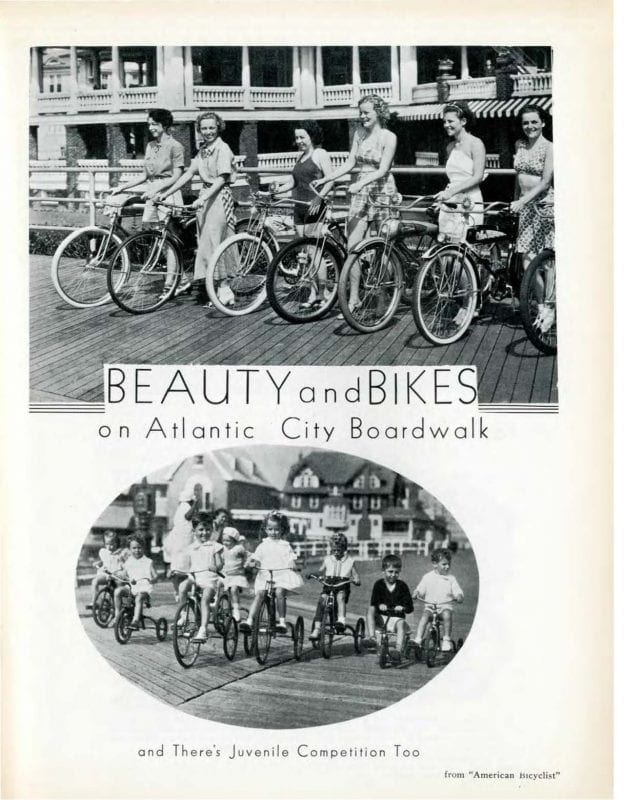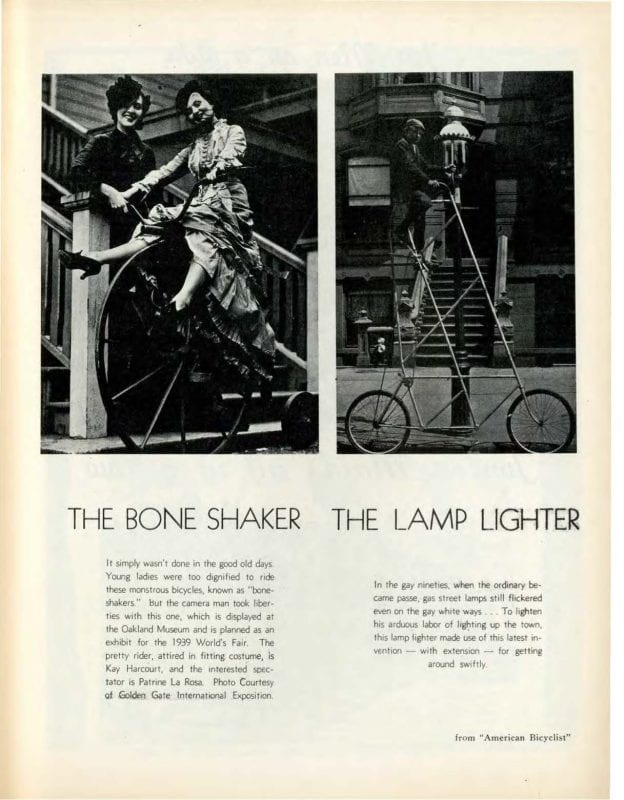
The title page of the Hub Cycle and Radio Company 4th Anniversary scrapbook, published in Boston in 1942.
Author: Shay Park, Archives Assistant
June 3 was World Bicycle Day! In preparation to write this post, I recently had the pleasure of sitting in on the Friends of the Bicycling History Collections’ quarterly meeting in May 2020. While officially it was to do a little recon for this post, it was a delight to witness some of the “behind the scenes” of their unique archiving project. University Archives and Special Collections (UASC) at UMass Boston holds a substantial amount of information for bicycling research and aspires to expand upon these collections and to become a national resource on bicycling history. This work is done with the invaluable guidance of the Friends of the Bicycling History Collections, who advise UMass Boston archivists on collecting activities and generate ideas and plans for outreach, fundraising, and other community-engaged activities related to the Bicycling History Collections.

A photo of the 1942 Victory bicycle, a special model of bicycle made during World War II, designed to use as few materials as possible.
Though I have worked at UASC for a year, our Bicycling History Collections consistently surprise me with their breadth and depth—across time and space, representing a wide variety of materials and covering a expansive range of topics and individuals. The collections hold artifacts such as pins and patches, as well as paper documents such as the records of the Bicycle Exchange, a beloved bicycle shop that operated in Harvard Square for over sixty years, the records of the Committee for Safe Bicycling, a citizen-run organization that existed from 1957 to 1974, and the papers of Cathy Buckley, a Central Transportation Planning Staff employee who assisted with the planning, design, and construction of the Minuteman Commuter Bikeway.

This clipping of an article from 1939 commemorates one hundred years since the first pedal bicycle was built by Scottish blacksmith Kirkpatrick Macmillian.
It was wonderful to attend the Friends’ meeting and hear about their continued efforts to archive bicycling history locally, regionally, and nationally, even in the context of the COVID-19 pandemic. They discussed their most recent attempts to solicit new materials and brainstormed new avenues to explore. The meeting was the first one they held over Zoom, and the consensus, to my surprise, was that everyone enjoyed (and some even preferred) the remote format. They were particularly excited by the prospect of inviting bicycling history experts from outside of Boston to attend the next meeting—something actually feasible with an online meeting platform. It was both comforting and inspiring to know they are committed to their project even under the most uncertain circumstances.

This page features images of tandem bicycles, with a reference to the chorus of the 1892 popular song “Daisy Bell (Bicycle Built for Two)”: “It won’t be a stylish marriage / I can’t afford the carriage / But you look sweet upon the seat / On a bicycle built for two.”
I’d like this blog post to function in a few different ways: as a celebration of World Bicycle Day; as a spotlight for our digital holdings, which feels particularly important during a time when archives are remote-only; and as a way not just to spread the word about our Bicycling History Collections, but to acknowledge the Friends who make them possible.
This post features selected digitized pages from the Hub Cycle and Radio Co. 45th Anniversary scrapbook, donated to UASC by Lorenz “Larry” Finison on behalf of William Herve Vandal. The scrapbook was published in 1942 by the now defunct Hub Cycle and Radio Company to mark the occasion of the company’s forty-fifth year. More than a commemoration of the Hub Cycle Company however, it is an ode to bicycling itself. In the foreword to the scrapbook, the author hails the bicycle as “fundamental”:
In this year, 1942, when Wartime models in bicycles are the pronouncement of the government, when gasoline and tire rationing are the orders of the day, the bicycle has come into prominence. … The Hub Cycle Company’s almost five decades of association with the bicycle is illustrated by the pictures and notes we have saved. They are the reflection of experience and evidence of a business that means much to you… that means much to us at Hub Cycle, who have lived a lifetime with the bicycle.

Photos of women and children on bicycles from American Bicyclist, a magazine published by the League of American Bicyclists since 1880. The League’s records (SC-0200) are held in University Archives and Special Collections.
The bulk of the scrapbook contains clippings of articles and photographs that document the cultural impact of bicycles in the United States during the first half of the twentieth century. Some are quite strange or amusing in 2020—such as the page that reminiscences about a time “when men wore handlebar mustaches and bicycles were built for two” (a reference to the song “Daisy Bell (Bicycle Built for Two)”) or the photos of the “Beauty and Bikes on Atlantic City Boardwalk.” Some, while temporally distant, take on a new relevance during a time of quarantine and closure; most allude to, explicitly or implicitly, to the shortages and rations during World War II that led to the bicycle’s prominence—a reminder of other times Americans have been called to sacrifice any comfort or convenience for the greater good. I also look at photos like those of the cycling tours, when highways were dominated by bicycles rather than cars, and marvel at how often, how greatly, and how inevitably our world changes, again and again, even the parts that seem immutable.

Photos circa 1935 featuring famous actors of the day on bicycles, such as Douglas Fairbanks Jr., Clark Gable, and Mickey Rooney.
Special thanks to Andrew Elder, Interim University Archivist and Curator of Special Collections, and Larry Finison, author, historian, and member of the Friends of the Bicycling History Collections. If you’d like to view more of the Bicycling History Collections or learn how to submit materials, check out the links below.
- View the digitized Hub Cycle and Radio Company 4th Anniversary scrapbook.
- For more information about the Friends of the Bicycling History Collections group, email BicyclingHistoryFriends@gmail.com.
- For information about donating materials to the Bicycling History Collections, please email Andrew Elder, Interim University Archivist and Curator of Special Collections in the Healey Library at UMass Boston, at Andrew.Elder@umb.edu.
- Submit photographs of bicycling history artifacts such as jerseys, t-shirts, or bicycles.
- View photographs of bicycling history artifacts in our digital collection.
- View the digitized bicycling history materials, including materials that were a part of the BICYCLING: Highlights from University Archives and Special Collections exhibition in 2015.
- View the finding aids for the Bicycling History Collections.

This photograph promotes the bicycle as a patriotic, prudent, and “healthful” alternative to the automobile, during a time when gasoline and tire shortages restricted Americans’ transportation options. According to the caption, cycling also had the added “essential” benefit of keeping women’s figures “trim.”

These photos show two early models of bicycles. The bone shaker, popular in the 1860s in France, was named for the uncomfortable, bumpy ride. The lamp lighter, or tall bike, was used in the 1890s to make lighting gas lamps faster and easier. Its seat was so tall that it usually required a ladder to mount it.

Thanks Shay, I appreciate your mentioning the Bicycle Exchange documents.
I am delighted to see the Hub Cycle stuff. In the 1930s the Bicycle Exchange was barely profitable. My dad’s main suppliers were Raleigh and Hub Cycle. One winter Ben couldn’t pay his bills. “J.B.” Jake Berkowitz, owner of Hub Cycle hired Ben to work in the Hub Cycle warehouse through the winter with half of his pay going toward the Bi-Ex bills. I wonder if any suppliers and retailers have similar supportive relationships.